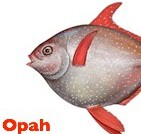
 In the past few years there have been numerous studies and necropsies documenting ingested plastic in fish species that people eat. The latest study from the University of Hawaii focused on large predatory fish from offshore waters around Hawaii over a six-year period. Ten species were investigated and seven of them had ingested varying levels of marine debris. Two species of opah, a popular fish to serve, had some of the highest ingestion rates. While it's alarming to have fish ingest plastic, what may be more alarming is the potential impact of bioaccumulating toxins that plastic can adsorb.
In the past few years there have been numerous studies and necropsies documenting ingested plastic in fish species that people eat. The latest study from the University of Hawaii focused on large predatory fish from offshore waters around Hawaii over a six-year period. Ten species were investigated and seven of them had ingested varying levels of marine debris. Two species of opah, a popular fish to serve, had some of the highest ingestion rates. While it's alarming to have fish ingest plastic, what may be more alarming is the potential impact of bioaccumulating toxins that plastic can adsorb.
While it is unfortunate that the study did not distinguish plastic pollution from marine debris, the photos with the press release show a majority of plastic-based items. “What was most surprising was that the fish that most frequently ingested debris are all thought to be deeper water species, generally those that live beneath the sunlit upper 500 to 600 feet of the water column,” Anela Choy said. “Deeper water fishes may have been coming up close to the surface to ingest debris, which is an unusual and unexpected behavior.”
 Regarding specifics on the opah, “In the two species found in Hawaiian waters, 58 percent of the small-eye opah and 43 percent of the big-eye opah had ingested some kind of debris. This was based on looking into the stomachs of almost 140 opah.” You can read the full press release here.
Regarding specifics on the opah, “In the two species found in Hawaiian waters, 58 percent of the small-eye opah and 43 percent of the big-eye opah had ingested some kind of debris. This was based on looking into the stomachs of almost 140 opah.” You can read the full press release here.
One big concern about plastic pollution in the ocean is that many forms of plastic can ADsorb toxins on their surface. That basically means that plastic can attract PCBs, organochlorine pesticides, metals, and petroleum hydrocarbons from sea water. Researchers don’t know how long debris stays in the stomachs of large fishes, or whether they are able to pass such debris. It is unknown whether the toxins are transmitted to the fish that consumes the plastic, or ultimately to humans who consume the fish.
We could be at a major tipping point so it seems urgent to find ways to stop the flow of plastics into the ocean. Plastic checkout bag bans and similar legislation are just the starting point. Manufacturers need to step up with better packaging for their products and eliminate polyethylene microbeads from skin-care products. Cities and states need to embrace the zero-waste concept for a cleaner future. You can help by 'voting with your dollars' on environmentally friendly products, becoming a Surfrider member and getting involved with your local Surfrider Chapter!